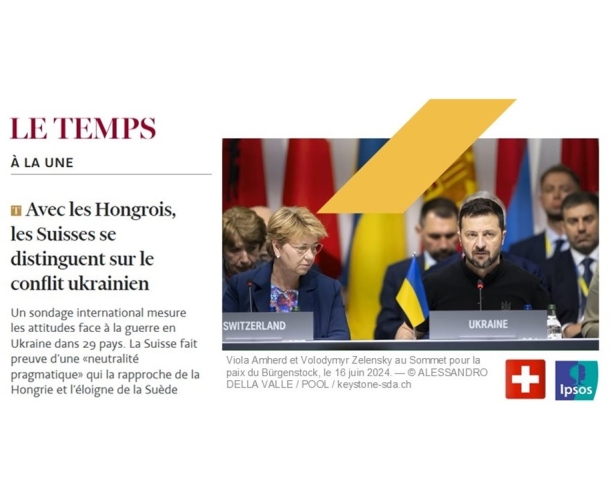

A striking 78% of Swiss believe their country should not get involved militarily in Ukraine war
The survey, carried out between March 21st and April 2nd, gathered responses from a representative sample of 500 individuals across Switzerland, ensuring a 95% confidence interval in the findings.
Key Findings:
- Muted optimism on the end of the war. Despite prevailing pessimism, optimism is emerging: 28% of Swiss respondents now believe the conflict in Ukraine will end in 2025, compared to only 22% et 23% in 2024 and 2023, respectively. This positive trend is observed in most of the countries surveyed and could be linked to the recent diplomatic initiatives and peace talks.
- However, the overall picture is still gloomy. Two-thirds of Swiss (63%) believe it is unlikely the war will end by January 2026, a sense of pessimism also perceived in Germany (71%). This sentiment is slightly less pronounced in France (54%), and even less in Italy (39%) which indicates a higher level of optimism compared to other European countries.
- Switzerland: Europe’s neutrality champion. Even in the face of a major conflict on Europe’s borders, Switzerland's historical tradition of impartiality remains dominant in public opinion. A striking 78% of Swiss respondents believe their country should not get involved militarily in Ukraine, a figure significantly higher than Germany (67%), France (59%), the Netherlands (50%), and Sweden (44%). Moreover, only 51% of Swiss people support assisting sovereign nations when they are attacked, one of the lowest rates among the 29 countries surveyed. This stands out significantly from France (67%), Germany (63%), Italy (63%), Great Britain (75%), and Sweden (79%). This cautious stance aligns with Switzerland's longstanding foreign policy, which prioritizes mediation over direct involvement in international conflicts.
- A fine line between fundamental values and pragmatism. 62% of Swiss citizens believe that doing nothing in Ukraine would encourage Russia to undertake further military actions elsewhere, a proportion similar to the global country average (63%) and to France (63%), but slightly higher than Germany (58%) and Italy (55%). Additionally, 60% believe that military action in Ukraine could encourage attacks on other countries, a level comparable to Italy (60%), Germany (59%), and France (58%). This dual concern indicates that the Swiss are cautiously assessing the risks associated with each option, whether it involves taking action or not. It reflects an approach where diplomatic pragmatism is combined with a clear assessment of threats so to maintain regional stability.
“This study reveals a Swiss position that is both unique and nuanced. On one hand, there is a deep commitment to Switzerland's historical tradition of neutrality, which is much more noticeable that of our European neighbours, with 78% of Swiss people opposed to any military involvement in Ukraine. On the other hand, our compatriots are fully aware of the geopolitical implications of the conflict, with 62% acknowledging that inaction could encourage further Russian military actions. This duality reflects the Swiss approach of balancing cautious optimism for peace with unwavering dedication to impartiality,” explains Marcus Burke, Director, ESG & Client Services of Ipsos Switzerland.
Read more here on the article featured in Le Temps: https://www.letemps.ch/articles/avec-les-hongrois-les-suisses-se-distinguent-sur-le-conflit-ukrainien/gifts/eEgpCwBYBFMK6rFXsb4u7HwA3GmqnnAm1yh5xd2J
Technical note:
- The survey, carried out between March 21st and April 2nd, gathered responses from a representative sample of 500 individuals across Switzerland, ensuring a 95% confidence interval in the findings.
- Ipsos interviewed 23,216 people online in 29 countries between Friday, March 21, and Friday, April 4, 2025. Quotas were set to ensure representativeness and data have been weighted to the known population profile of each country. The sample consists of approximately 2,000 individuals in Japan, 1,000 individuals each in Australia, Belgium, Brazil, Canada, France, Germany, Great Britain, Italy, Spain, and the U.S., and 500 individuals each in Argentina, Chile, Colombia, Hungary, Indonesia, Ireland, Malaysia, Mexico, the Netherlands, Peru, Poland, Singapore, South Africa, South Korea, Sweden, Switzerland, Thailand, and Türkiye. The sample in India consists of approximately 2,200 individuals, of whom approximately 1,800 were interviewed face-to-face and 400 were interviewed online.



